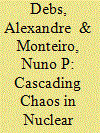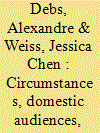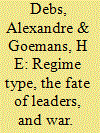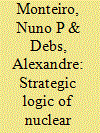|
|
|
Sort Order |
|
|
|
Items / Page
|
|
|
|
|
|
|
| Srl | Item |
| 1 |
ID:
159267


|
|
|
| 2 |
ID:
144797


|
|
|
|
|
| Summary/Abstract |
We present a new theory of interstate crisis bargaining. A country’s resolve is a function of intrinsic qualities of the government and external circumstances, both of which are unknown by the domestic electorate and the foreign country. When domestic political debate reveals that circumstances favor the use of force, the government can extract better terms than if circumstances are revealed to be unfavorable. The revelation of circumstances, however, exacerbates reputational incentives. Because governments can no longer hide behind unknown circumstances, voters can better discern the government’s type from its actions, strengthening the incentives to appear resolved. The model bridges the gap between audience costs and its critiques, showing how domestic audiences punish leaders for inappropriate policies rather than empty threats. At the same time, it highlights how the prospects for peace are worse if uncertainty about the circumstances is removed, suggesting that greater transparency does not always promote peaceful outcomes.
|
|
|
|
|
|
|
|
|
|
|
|
|
|
|
|
| 3 |
ID:
146184


|
|
|
|
|
| Summary/Abstract |
What makes certain dictatorships more likely than others to democratize? I argue that military dictators, as specialists in violence, often remain threats to their successors. However, when democratic systems replace military dictatorships, that expertise presents less danger to new incumbents. Because democracies select leaders through elections, they reduce the importance of military expertise—and the role of associated violence—in contests for office. Thus, military dictatorships should prove more likely to transition quickly to democracy; military dictators will expect a lower likelihood of punishment—including death—at the hands of their successors than if they are replaced by other dictators. Therefore, incumbent military dictators see democratic systems as less dangerous to them; they face specific incentives to ensure a quick and effective transition to democracy. I provide support for my theory with evidence from the post-World War II period.
|
|
|
|
|
|
|
|
|
|
|
|
|
|
|
|
| 4 |
ID:
100764


|
|
|
|
|
| Publication |
2010.
|
| Summary/Abstract |
We propose and test a formal model of war and domestic politics, building on recent evidence on the relationship between regime type, the effect of war on the probability of losing office, and the consequences of losing office. The less the outcome of international interaction affects a leader's tenure and the less punitive are the consequences of losing office, the more a leader is willing to make concessions to strike a peaceful bargain. We demonstrate that our theory successfully predicts war involvement among nondemocratic regime types. Moreover, our theory offers an intuitive explanation for the democratic peace. Compared to nondemocratic leaders, the tenure of democratic leaders depends relatively little on the war outcome, and democratic leaders fare relatively well after losing office. Thus, democratic leaders should be more willing and able to avoid war, especially with other democrats.
|
|
|
|
|
|
|
|
|
|
|
|
|
|
|
|
| 5 |
ID:
135330


|
|
|
|
|
| Summary/Abstract |
When do states acquire nuclear weapons? To address this question, a strategic theory of nuclear proliferation must take into account the security goals of all of the key actors: the potential proliferator, its adversaries, and, when present, its allies. To acquire nuclear weapons, a state must possess both the willingness and the opportunity to proliferate. Willingness requires the presence of a grave security threat against which no ally offers reliable protection. Opportunity requires that the state pursuing nuclear weapons possess high relative power vis-à-vis its adversaries or enjoy the protection of a powerful ally. Whereas a relatively weak state without a powerful ally lacks the opportunity to develop a nuclear capability, one with such an ally lacks the willingness to do so. Therefore, only powerful states or relatively weak states with allies that do not guarantee fulfillment of at least some of their key security goals will acquire the bomb. These claims are supported by the overall pattern of nuclear proliferation as well as detailed analyses of the Soviet, Iraqi, Pakistani, South Korean, and West German nuclear development cases.
|
|
|
|
|
|
|
|
|
|
|
|
|
|
|
|
|
|
|
|
|